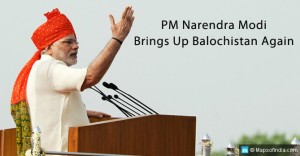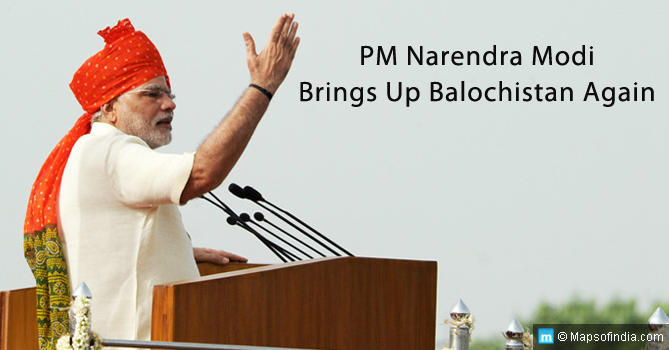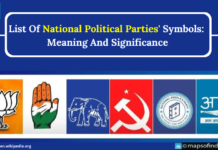 Prime Minister Narendra Modi broke new grounds when he spoke briefly of the plight of local people of Balochistan and Gilgit-Baltistan areas of Pakistan and how they were looking towards India for support for their struggle for independence.
Prime Minister Narendra Modi broke new grounds when he spoke briefly of the plight of local people of Balochistan and Gilgit-Baltistan areas of Pakistan and how they were looking towards India for support for their struggle for independence.
An Indian Prime Minister speaking on Balochistan and Gilgit-Baltistan in an Independence Day speech is not just surprising but also marks a deviation from our existing foreign policy of leaving those contentious areas out of public discourse in India.
The move has attracted a lot of attention, especially in those parts of Pakistan and from their supporters living in exile in Europe and the US. PM Modi’s public stance in support of their cause has given these rather stifled voices a new lease of hope to renew their struggle for independence.
A large section on the Indian side is rubbing their hands in glee that finally India has woken up and is retaliating to years of Pakistani sponsored needling and stoking of violence in Kashmir valley.
In fact there is a growing lobby in India that is calling for more direct support in terms of finance, material and training to further the call for freedom of Balochistan and Gilgit-Baltistan from Pakistan. Several hard line voices are demanding a Bangladesh-like support that led to erstwhile East Pakistan breaking away as Bangladesh.
So what exactly is India’s position and strategy in dealing with an increasingly belligerent Pakistan?
PM Modi’s speech notwithstanding, India’s public call in support of people in these restive regions of Pakistan is a double-edged sword that could go against India’s long standing position of holding a higher moral ground on J&K.
The geo-political situation and the balance of power today is vastly different from 1971 when India decided to stand up to both US and China, in moving forward towards the creation of Bangladesh. Pakistan then was just an average conventional military power, with limited resources to fight on two fronts with India. With local population in support of Indian military intervention, the advantage clearly lay with India and the rest is history.
Changing geo-political equations
Cut to 2016 and the geo-political situation today is drastically different. We now have a nuclear Pakistan that is fighting rising Islamic radicalism from within and a subservient civilian government struggling to stay independent of military control, in establishing a semblance of stability and civil governance.
Its former ally, the United States has all but given up on Pakistan and has now shifted its strategic preference to an emerging and strong India. China has always been a bell weather friend of Pakistan, however, China today is far more economically and militarily stronger than it was way back in 1971.
China has now emerged as Pakistan’s strongest ally providing finance, equipment and political support in international forums, a role earlier played by United States. On the other hand, Saudi Arabia which was one of Pakistan’s biggest financiers, is now in the process of redefining its relationship with both Pakistan and India.
Former Soviet Union was India’s strongest supporter but post break-up, the new Russia is now re-establishing its foreign policy. Its renewed cold war with the US and NATO is forcing it to come closer to China. Therefore, with China and Pakistan on one side and with a relatively neutral Russia on the other, India has a lot to rethink before it internationalizes Balochistan, along with Gilgit-Baltistan in POK.
China has been protecting Pakistan in the United Nations Security Council and General Assembly, while the US has been rather subdued in its condemnation of Pakistan, in an attempt to keep its doors open with the former ally.
Until now, India has been successful in isolating Pakistan in the UN on J&K, with most nations in support of India’s position. But with India now bringing Balochistan and POK into the equation, has India bitten off more than it can chew? Have we played into Pakistan’s hand by unwittingly equating J&K with Balochistan, thereby negating the advantage India had built over time on Pakistani-sponsored terrorism in the valley?
Congress Party must take its share of the blame for allowing the J&K problem to fester all these years. It had several opportunities to take a bold political stance and seek a solution through political dialogue but it procrastinated.
BJP’s coming to power at the centre in 2014 has not helped either. Its subsequent power sharing strategy with the PDP in the state seems to be a failure, with CM Mehbooba Mufti being as clueless on handling the situation as the BJP is in the state and in New Delhi.
With curfew now extending into its 40th day, the situation is not showing any signs of improvement. Under these circumstances, was it prudent for PM Modi to rake up Balochistan at a time when our military and paramilitary forces are bogged down in containing the situation in the valley?
A viable solution needed
The problem is that India does not have a long term vision or strategy in J&K, and for that matter, POK and Balochistan. The political fraternity across party lines in India is equally divided and confused.
For several years now, the central government has been fighting the situation from day-to-day, without any clear plan on winning local hearts and minds. Any period of relative peace is mistaken to be a vote in support of the Indian state and led to political complacency.
India today, has little to achieve in promoting Balochistan in retaliation to Pakistan’s support to militancy in J&K. Iran, a Shia-dominated country with a natural distrust of a Sunni-dominated Pakistan, is not in support of an independent Balochistan, despite sharing a long border with the province.
In light of the above, one has to question PM Modi’s decision to make a significant foreign policy shift in offering support for an independent Balochistan and POK. India has done well so far in holding the upper hand on J&K, with Pakistan’s position largely ignored by the international community. Balochistan could change all of that given Pakistan’s repeated assertions that India has been instigating militancy in Balochistan.
Pakistan deserves a strong response from India for sure, but using Balochistan may be a blunder that India needs to avoid. It’s time for PM Modi to show political sagacity in reaching out directly to the people of the valley, for a human touch can sometimes achieve much more than political tug-of-war.




